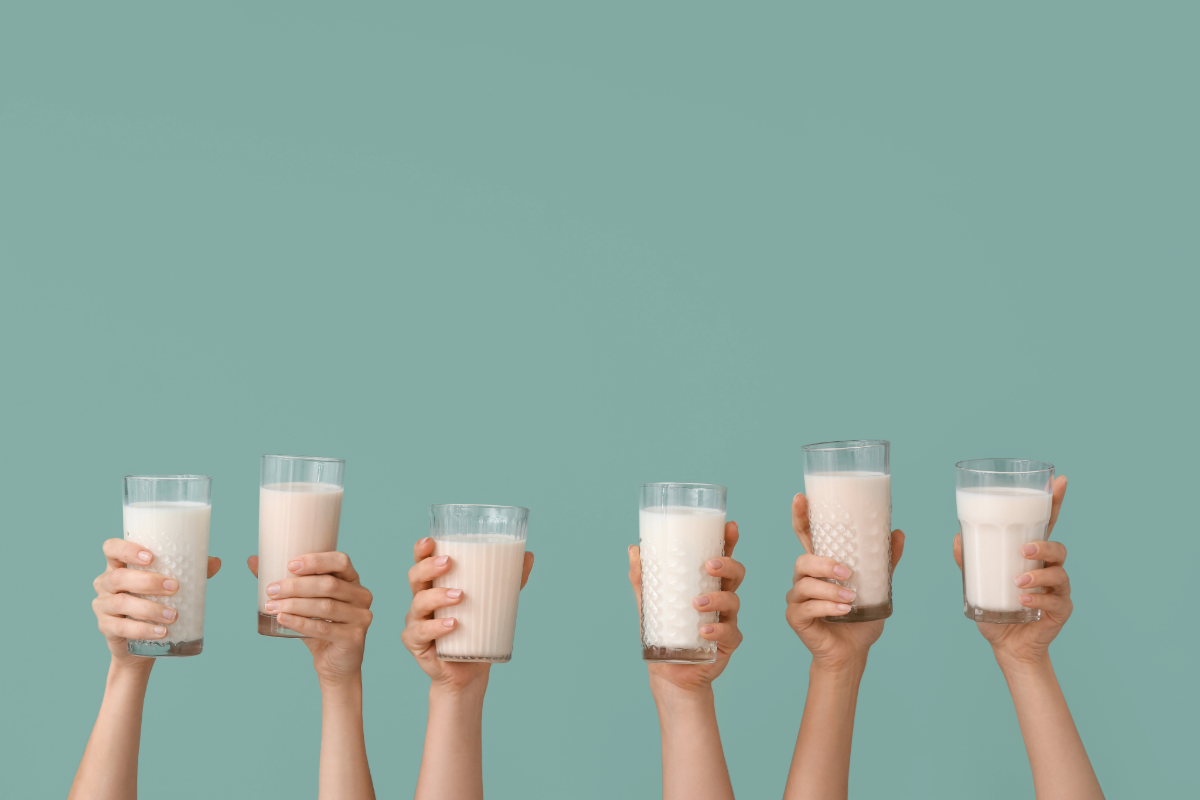From bustling cafes to grocery aisles, plant-based milk is popping up everywhere! This global phenomenon begs the question: what’s driving the change? Is it just a passing fad, or are there compelling reasons to ditch the cow’s milk?
At RA Balance Bahamas, we’ve witnessed firsthand the positive impact plant-based milk can have on well-being, from improved digestion to increased energy levels. In this blog post, we’ll explore the factors fueling this trend and offer tips on selecting the right plant-based milk for your unique needs and taste. Dive in and discover why plant-based milk might just be the key to unlocking a healthier, happier you!
Is Plant-based Milk Really Better for You?
For those with dairy allergies or sensitivities, the answer is a resounding yes. But even if you can handle a glass of cow’s milk, plant-based alternatives offer a multitude of health benefits that make them a compelling choice. Here are just a few of them:
1. Hormone-Free Goodness
One significant advantage of plant-based milk is that it doesn’t contain the elevated hormone levels found in cow’s milk. Cows in modern factory farms are often subjected to serial pregnancies, leading to increased levels of hormones like estrogen in their milk. Studies suggest that added estrogen in humans could raise the risk of breast, uterine, and prostate cancers.
Factory-farmed dairy cows are often given high doses of antibiotics, some of which can end up in your milk. This can result in the development of antibiotic resistance, trigger allergic reactions, and disrupt the balance of your gut bacteria.
Plant-based milks offer a naturally hormone- and antibiotic-free alternative for a healthier lifestyle.
Related: The Gut-Health Connection: How Your Gut Affects Your Overall Health
2. Trim the Fat
While some nutritional aspects of plant-based milks mirror those of cow’s milk, the fat content differs significantly. Compared to a cup of whole-fat cow’s milk, most plant-based milks boast up to 75% less fat. This can be beneficial for those looking to reduce their fat intake or make healthier choices.
3. Sugar & Calories
Did you know? A cup of cow’s milk packs 12 grams of sugar from lactose! Unsweetened plant-based milks often have just 1 gram, making them a dream for sugar-conscious folks. And the best part? Almond, oat, rice, and coconut milk often boast lower calorie counts compared to their dairy counterpart.
Health Concerns About Dairy Beyond Lactose Intolerance
The truth is, dairy isn’t always your friend. Saturated fat in cow’s milk is a major contributor to heart disease, a leading cause of death. Studies even question the link between dairy and bone health, suggesting other dietary sources might be just as effective. Don’t forget, lactose intolerance affects over 65% of the global population, causing digestive discomfort for many.
The Link Between Cancer, Inflammation, and More
Research hints at a potential link between high dairy intake and increased risks of cancers like breast and prostate. Chronic inflammation, linked to numerous health issues, may also be fueled by dairy consumption. Choosing plant-based alternatives can be a proactive step towards reducing these risks and promoting overall well-being.
The Impact of Dairy on the Planet
The idyllic pasture scenes often associated with dairy production mask a stark reality – the industry casts a hefty shadow on our planet. Dairy cows contribute roughly 14.5% of global livestock methane emissions, potent greenhouse gasses warming the atmosphere at 80 times the rate of carbon dioxide. This contribution translates to roughly 4% of all human-induced greenhouse gas emissions.
Beyond climate change, the industry poses threats to local ecosystems. Untreated manure and fertilizer runoff pollute waterways, leading to eutrophication and harmful algal blooms. Intensive feed production often requires clear-cutting natural ecosystems like rainforests and prairies, contributing to deforestation and biodiversity loss.
Fortunately, conscious consumers have an empowering choice: plant-based milks. Compared to dairy milk, plant-based alternatives typically require:
- Less land. Oat milk, for example, uses up to 85% less land than dairy milk.
- Less water. Coconut milk boasts a significant water footprint reduction compared to dairy.
- Lower greenhouse gas emissions. Almond milk produces roughly 80% lower emissions than dairy milk.
By opting for plant-based milks and embracing a plant-forward diet, individuals can significantly reduce their environmental footprint and contribute to a more sustainable future. Every sip becomes a step towards a healthier planet, free from the shadow of intensive dairy production.
Helpful Tips for Your Plant-Based Milk Journey
The world of plant-based milk is a playground for your taste buds! From creamy oat wonders to nutty almond delights and protein-packed soy powerhouses, explore options from fruits, grains, legumes, nuts, and even seeds. Flavors dance from classic vanilla to tempting chocolate and beyond, ready to fuel your body and tantalize your senses.
Experiment with different brands and types until your taste buds do a happy dance. Remember to check the nutrition label for your desired goodies like calcium and vitamin D.
Exploring the Variety of Plant-based Milks
The spectrum of plant-based milk extends far beyond almond and oat options. Consider exploring milks derived from:
- Fruit: Banana milk, anyone?
- Grains: Rice, quinoa, and oat milks offer delightful depth.
- Legumes: Pea and soy milk can provide a significant protein boost.
- Nuts: Almond, cashew, and coconut for those seeking a creamy, slightly sweet profile.
- Seeds: Hemp, sesame, and flaxseed for unique tastes and potential nutritional benefits.
And don’t forget, within each type, you’ll often find flavor variations like chocolate and vanilla, and sweetness options from naturally smooth to delightfully sweetened.
Need a little personalized guidance? A healthcare professional or dietitian can be your guide, offering tips for a smooth transition to plant-based milk.
Go forth, explore, and discover the plant-based milk that perfectly complements your taste and nutrition needs.
The Milk Challenge: Feel the Difference Yourself
Ready to put plant-based milk to the test? Take the “Milk Challenge”! Ditch cow’s milk and all its products (cheese, cream, ice cream) for one month. Notice how you feel? More energy, clearer skin, improved digestion? You might be surprised by the positive changes! And remember, you’re not only doing your body a favor, but also lessening your environmental footprint.
Fueling a Healthier You
Our modern diet, often packed with processed foods and unhealthy fats, can silently trigger chronic inflammation – a hidden source of many health issues. But there’s good news! You can fight back with every bite. Choose plant-based milk along with vibrant fruits, nourishing vegetables, and wholesome whole grains – nature’s anti-inflammatory powerhouses. Think of food as medicine, fueling your body with goodness and nurturing its natural healing power.
But it’s not just about what you eat – it’s how you move! Regular exercise strengthens your body, boosts mood, and keeps inflammation at bay.
Consider adding Biomagnetic Therapy to your wellness toolkit. This holistic therapy aims to restore balance and optimize well-being, helping you achieve your ultimate health goals.
Final Thoughts
Plant-based milk isn’t just a trend; it’s a choice for a healthier, more vibrant you. Consider taking the “Milk Challenge,” unleash the power of plant-based options, and fuel your body with goodness. For further information about Biomagnetic Therapy or support on your plant-powered journey, Reach Out to RA Balance Bahamas – we’re here to help you flourish!

